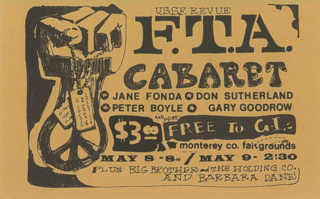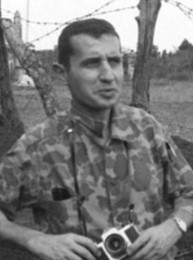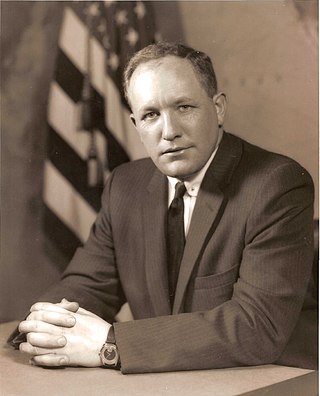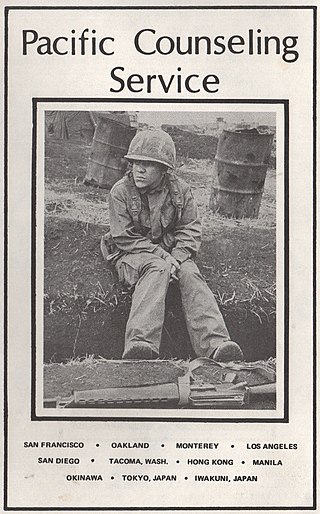Related Research Articles

Stars and Stripes is a daily American military newspaper reporting on matters concerning the members of the United States Armed Forces and their communities, with an emphasis on those serving outside the United States. It operates from inside the Department of Defense, but is editorially separate from it, and its First Amendment protection is safeguarded by the United States Congress to whom an independent ombudsman, who serves the readers' interests, regularly reports. As well as a website, Stars and Stripes publishes four daily print editions for U.S. military service members serving overseas; these European, Middle Eastern, Japanese, and South Korean editions are also available as free downloads in electronic format, and there are also seven digital editions. The newspaper has its headquarters in Washington, D.C.
An Amerasian may refer to a person born in Asia to an Asian mother and a U.S. military father. Other terms used include War babies or G.I. babies. Other persons of such ancestry may have mothers in the U.S. military or have Amerasian ancestry through their grandparents, and so on.

Yank, the Army Weekly was a weekly magazine published by the United States military during World War II.

The FTA Show, a play on the common troop expression "Fuck The Army", was a 1971 anti-Vietnam War road show for GIs designed as a response to Bob Hope's patriotic and pro-war USO tour. The idea was first conceived by Howard Levy, an ex-US Army doctor who had just been released from 26 months in Fort Leavenworth military prison for refusing orders to train Green Beret medics on their way to the Vietnam War. Levy convinced actress Jane Fonda who recruited a number of actors, entertainers, musicians and others, including the actors Donald Sutherland, Peter Boyle, Garry Goodrow and Michael Alaimo, comedian and civil rights activist Dick Gregory and soul and R&B singer Swamp Dogg. Alan Myerson, of San Francisco improv comedy group The Committee, agreed to direct, while cartoonist and author Jules Feiffer and playwrights Barbara Garson and Herb Gardner wrote songs and skits for the show. Fred Gardner, the originator of the antiwar GI Coffeehouse movement, became the Tour's "stage manager and liaison to the coffeehouse staffs." At various times other actors, writers, musicians, comedians and entertainers were involved. The United States Servicemen's Fund (USSF), with Dr. Levy as one of its principal organizers, became the official sponsor of the tour. The anti-Vietnam War USSF promoted free speech within the US military, funded and supported independent GI newspapers and coffeehouses, and worked to defend the legal rights of GIs. Sponsorship was later taken over by a group called the Entertainment Industry for Peace & Justice (EIPJ).

Sir! No Sir! is a 2005 documentary by Displaced Films about the anti-war movement within the ranks of the United States Armed Forces during the Vietnam War. The film was produced, directed, and written by David Zeiger. The film had a theatrical run in 80 cities throughout the U.S. and Canada in 2006, and was broadcast worldwide on Sundance Channel, Discovery Channel, BBC, ARTE France, ABC Australia, SBC Spain, ZDF Germany, YLE Finland, RT, and several others.
The abbreviation or acronym RITA stands for "Resistance Inside the Army", "Resister Inside the Army", or "Resist! Inside the Army".

The Brinks Hotel in Saigon, also known as the Brink Bachelor Officers Quarters (BOQ), was bombed by the Viet Cong on the evening of December 24, 1964, during the Vietnam War. Two Viet Cong operatives detonated a car bomb underneath the hotel, which housed United States Army officers. The explosion killed two Americans, an officer and an NCO, and injured approximately 60, including military personnel and Vietnamese civilians.

Jeff Sharlet (1942–1969), a Vietnam veteran, was a leader of the GI resistance movement during the Vietnam War and the founding editor of Vietnam GI. David Cortright, a major chronicler of the Vietnam GI protest movement wrote, "Vietnam GI, the most influential early paper, surfaced at the end of 1967, distributed to tens of thousands of GIs, many in Vietnam, closed down after the death of founder Jeff Sharlet in June, 1969."

Malcolm Wilde Browne was an American journalist and photographer, best known for his award-winning photograph of the self-immolation of Buddhist monk Thích Quảng Đức in 1963.

François Sully (1927–1971) was a French journalist and photographer best known for his work during the Vietnam War. Sully was one of the earliest journalists to cover the Vietnam War and spent 24 years in Indochina. At the time of his death in a command helicopter crash near the Cambodian border, he was viewed as the dean of the Saigon press corps.
During World War II, Egbert White (1894–1976) had a major role in establishing newspapers for US soldiers that were written and edited by enlisted men, not by the Army top command. He had served with the Stars and Stripes newspaper during World War I and between the wars worked in advertising.

Howard Edward Haugerud was an American government official who served in presidentially appointed positions at the Department of Defense and the Department of State during the administrations of Presidents Kennedy, Johnson and Nixon. He later became the senior vice president of the Dana Holding Corporation, a managing director of the family-owned TASEA Investment and Development Company, CEO of Controlled Environment Systems, Chairman and CEO of the National Tribune Corporation, publisher and editor-in-chief of the Stars and Stripes newspaper, president of the Stars and Stripes Foundation and president of the real estate holding firm Trout Run, LLC.
Edwin Quigley White was an American journalist who served as the Saigon bureau chief for the Associated Press from 1965 until 1975 during the height of the Vietnam War. Professionally, he was known as Quigley by colleagues. Those same colleagues also nicknamed him "unflappable Ed" for his calm demeanor in a crisis, particularly during his more than ten-year assignment covering the Vietnam War.

GI's Against Fascism was a small but formative organization formed within the United States Navy during the years of conscription and the Vietnam War. The group developed in mid-1969 out of a number of sailors requesting adequate quarters, but coalesced into a formal organization with a wider agenda: a more generalized opposition to the war and to perceived institutional racism within the U.S. Navy. Although there had been earlier antiwar and GI resistance groups within the U.S. Army during the Vietnam era, GI's Against Fascism was the first such group in the U.S. Navy. The group published an underground newspaper called Duck Power as a means of spreading its views.

The Movement for a Democratic Military (MDM) was an American anti-war, anti-establishment, and military rights organization formed by United States Navy and Marine Corps personnel during the Vietnam War. Formed in California in late 1969 by sailors from Naval Station San Diego in San Diego and Marines from Camp Pendleton Marine Base in Oceanside, it rapidly spread to a number of other cities and bases in California and the Midwest, including the San Francisco Bay Area, Long Beach Naval Station, El Toro Marine Air Station, Fort Ord, Fort Carson, and the Great Lakes Naval Training Center.

Terry Marvell Whitmore was an American soldier, deserter and actor.
Guy Thomas Viskniskki was a career newspaper editor and news executive who founded the historic World War I edition of The Stars and Stripes newspaper while serving as a U.S. Army officer in France with the American Expeditionary Force. Viskniskki established the tradition of The Stars and Stripes as an independent American newspaper for military personnel serving overseas, a tradition that continues to the present day.

The Pacific Counseling Service (PCS) was a G.I. counseling service organization created by antiwar activists during the Vietnam War. PCS saw itself as trying to make the U.S. Armed Forces "adhere more closely to regulations concerning conscientious objector discharges and G.I. rights." The Armed Forces Journal, on the other hand, said PCS was involved in "antimilitary activities", including "legal help and incitement to dissident GIs." PCS evolved out of a small GI Help office started by a freshly discharged Air Force Sergeant in San Francisco, California in January 1969. The idea rapidly caught on among antiwar forces and within a year PCS had offices in Monterey, Oakland, and San Diego in California, plus Tacoma, Washington. By 1971 it had spread around the Pacific with additional offices in Los Angeles, Hong Kong, Okinawa, the Philippines, as well as Tokyo and Iwakuni in Japan. Each location was established near a major U.S. military base. At its peak, PCS was counseling hundreds of disgruntled soldiers a week, helping many with legal advice, conscientious objector discharges and more. As the war wound down, ending in 1975, the offices closed with the remaining office in San Francisco printing its last underground newspaper in 1976.

The GI Underground Press was an underground press movement that emerged among the United States military during the Vietnam War. These were newspapers and newsletters produced without official military approval or acceptance; often furtively distributed under the eyes of "the brass". They were overwhelmingly antiwar and most were anti-military, which tended to infuriate the military command and often resulted in swift retaliation and punishment. Mainly written by rank-and-file active duty or recently discharged GIs, AWOLs and deserters, these publications were intended for their peers and spoke the language and aired the complaints of their audience. They became an integral and powerful element of the larger antiwar, radical and revolutionary movements during those years. This is a history largely ignored and even hidden in the retelling of the U.S. military's role in the Vietnam War.

Daniel Leo Coberly is an author, journalist, historian, and noted civil servant from the United States. The son of a Special Forces Non-commissioned officer with the United States Army, and a French war bride he was born in Fort Belvoir, Virginia.
References
- ↑ Al Stump in True, July 1967
- ↑ "Woman Fights Press Gag," Los Angeles Examiner, July 27, 1953
- ↑ https://www.amazon.com/Schizophrenic-Germany-John-Dornberg/dp/B0000BIGS1
- ↑ https://www.bloomsbury.com/au/author/john-dornberg/
- ↑ https://catalogue.nla.gov.au/catalog/1175187
- ↑ Life Dec. 23, 1957
- ↑ Newsweek, July 18, 1966.
- ↑ Time, June 09, 1961.
- ↑ https://www.newspapers.com/article/the-huntsville-times-reference-to-marthe/35053543/
- ↑ Overseas Weekly, Apr. 16, 1961.
- ↑ Time, June 09, 1961.
- ↑ Maj. Gen. Edwin A. Walker Admonished June 12, 1961.
- ↑ N Y Times, 28 Oct 1969